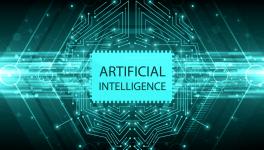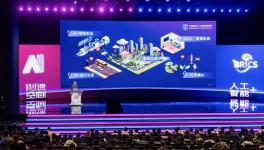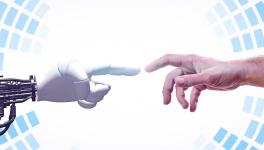Will Machines Replace Human Beings: AlphaGo and DeepMind
Artificial intelligence (AI) or machine intelligence has always been a little scary. We picture evil robots controlling the world and making human beings obsolete or, even worse, using us as energy sources as in the Matrix. The defeat by Google's DeepMind – a computer program – of the world champion in Go, an ancient Chinese board game, has reinforced the apocalyptic vision of machines taking over the world in the popular media.
Not that this vision is totally wrong. The more we transfer human skills to the machine, the more obsolescence in the work force. This is not peculiar to the current age; this happened during the industrial revolution as well. The difference is that computers today can do tasks that are relatively undefined, what we thought was the preserve of humans. As machines become more “intelligent”, they can displace labour even in the service sector. The whole service economy today is in the same position that the weavers were in before the industrial revolution. As machines displaced the self-employed weavers with their spinning wheels and the looms, there were huge dislocations. They led led to the Luddite revolt in England, and the bones of weavers bleaching in the sun in the plains of northern India. The existing service economy could now be faced with a similar scenario.
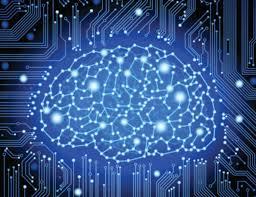
Image Courtesy: commons.wikimedia.org
So what is Go and what did AlphaGo do? Go has a devoted set of followers in China and East Asia. In Korea alone, Go has 8 million followers. In Go, two opponents alternate, placing white or black stones at the intersection of any two lines on a 19-by-19 grid board. Players capture space when their stones completely surround their opponent’s stones. The game ends when there are no moves left, and the player who controls more of the board is the winner.
So what did Google's DeepMind computer program do and why is it so important? This year, DeepMind played a series of five games with the world champion in Go, Lee Seedol of Korea, beating him four to one. It is a feat that no computer has been able to do before, and thought to be at least a decade away.
Deep Blue, the IBM computer program, beat the world champion in chess, Gary Kasparov, in 1997. On an average, in any move, Go has about 250 possible variations. Compare this with chess where, on an average, we have about 35 possible legal moves, and we see why Go is so much more complex than chess.
The key difference between IBM's Deep Blue and Google's DeepMind was that this time, Deep Blue's brute force strategy of working out all possible moves was not going to work. Possible Go positions on a board are too high; all possible Go positions are supposed to be more than atoms in the universe. So unlike Deep Blue, DeepMind had to master what were thought to be peculiarly human traits: intuition of the game, evaluating positions, and seeing what leads to a stronger position rather than winning or losing pieces as in chess.
The strategy used by DeepMind is a variant of artificial neural networks and belongs to a group of techniques called deep learning. It mimics how the human brain learns. It is used from face recognition to speech recognition, or what is called natural language processing. If you feed this a number of photographs, or a set of words, it sorts it out in a way that it can match them to what it has already categorised. Unlike other methods, it can also learn the “rules” without being previously programmed with such rules. This works in Go, as improved positions on the board are such rules that cannot be broken down into neat little algorithms that computers can easily process.
The Google team fed their DeepMind about 30 million Go games. That is how it learnt to play Go, working out a positional sense and board intuition. They also went further. They had the AI's play each other in a vast simulation exercise. AlphaGo learnt new strategies this way, which then became a part of its repertoire. The DeepMind team also used the games that the machines had played against each other in training the neural networks further. They then secretly played AlphaGo against one of the top Go players in the world, three-time European champion Fan Gui, before their man-versus-machine challenge to the current reigning world champion Lee Seedol.
During the second game, AlphaGo did something that no human player anticipated. Under attack in one part of the board, it contra-intuitively attacked in another part. This proved to be a brilliant move. Fan Gui said that he first thought it was a mistake. So did Lee Seedol. But it was the turning point of the game, when Lee Seedol realised that he could be surprised. Not that this was the only surprise. Lee Seedol himself came up with a surprising move in Game 4, which Go players would not normally make. The machine did not know how to respond, and made a series of mistakes in this uncharted territory. It lost this game, the only one Seedol was able to win.
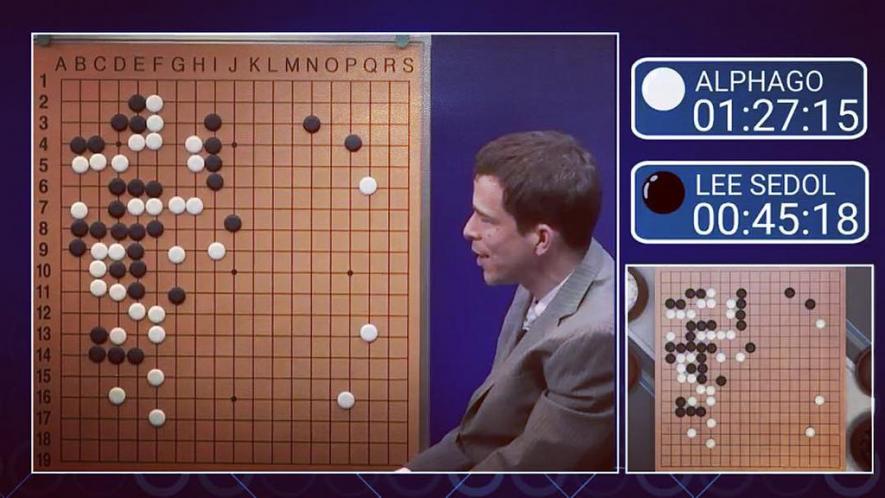
Image Courtesy: flickr.com
The machine mastering a complex game like Go is indeed a milestone in AI or what should, more correctly, be called machine intelligence. But, as Cade Metz wrote in Wired , one should not make too much of it. Yes, it can beat the best player in Go, but it cannot do a whole set of things any human being can do, including hold a halfway decent conversation. What a machine can do today – provided with enough resources in hardware, software and fed data – is beat a human being in a specific task. It is hard to imagine any task today – provided it is narrow and can be well defined – that a machine cannot master better than a human being.
But what happens when there are no rules, or if we make up the rules as we go along? Let us not forget that Go is a 19 by 19 grid and the range of possible moves is strictly defined, including what constitutes victory and defeat. What happens in the game of life where we, as society, define and redefine our rules? This is well beyond formulating as an AI problem.
To put machine intelligence in context, we need to see what the industrial revolution did to society and to the craftsmen. It transferred the skills of the human craftsmen to the machine. Before the industrial revolution, five spinners were needed to feed enough yarn to a weaver. The water frame and, later, the steam engine driven frame, changed all that. Focussing on the use of motive power in textile machinery misses the fact that the machines also did a set of tasks that were earlier done by humans being. This, as Marx observes, is because capital first breaks down all the manual tasks of the spinner, later the weaver, into their components and then automates them.
This is what we are doing now for mental labour: breaking down the way we think about various tasks, mimicking them in the machine and then using machines to do what human beings can do. It is possible to replace a whole range of human tasks by the machine. The McDonald's worker, the ticket seller in the multiplex, the driver for the cars, all can, conceivably, be replaced in the next decade. What will matter is the cost of the machine versus the cost of labour – the basic equation under capitalism.
Marx noted that it is with capitalism that we get the machines as the enemy of the human beings. What should be a device that takes away the drudgery of mindless, repetitive work, becomes the enemy of the people's livelihood. Under capitalism, the machine will replace the human being. This will not change with a “gentler, kinder” form of capitalism. It is a system in which any advance in technology militates against the human being. What we need is a system where advances in technology generate more leisure, release the creative energies of the people; a system that puts the human being at the core of society rather than capital and profits; a socialist system.
With advanced machine intelligence, the prospect for humanity is not necessarily bleak. Michael Littman, in his blog in Scientific American writes, “I think the key is that human intelligence is constantly redefining and extending itself, incorporating new facets built on top of everything that came before. As such, the rules of the game constantly change. The metrics for success change. Even the very purpose of existence changes.” We should think instead about the purpose of our society. The battle is not machines versus humans, but what kind of society we want.
Disclaimer: The views expressed here are the author's personal views, and do not necessarily represent the views of Newsclick
Get the latest reports & analysis with people's perspective on Protests, movements & deep analytical videos, discussions of the current affairs in your Telegram app. Subscribe to NewsClick's Telegram channel & get Real-Time updates on stories, as they get published on our website.









